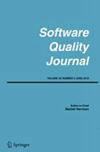从复制基于信息检索的测试用例优先级研究中获得的经验教训
IF 2.3
3区 计算机科学
Q3 COMPUTER SCIENCE, SOFTWARE ENGINEERING
引用次数: 0
摘要
重复性研究通过评估先前的研究结果来帮助巩固和扩展知识。软件工程文献表明,在没有人类参与的情况下,对软件工件进行的复制太少了。本研究旨在复制一个基于工件的软件测试研究,以解决与复制相关的差距。在这项调查中,我们专注于(i)提供复制的一步一步的指导,在复制基于工件的测试研究时反映挑战,以及(ii)评估关于结果的有效性和稳健性的复制研究。我们复制了Kwon等人提出的测试用例优先排序技术。我们使用六个软件程序复制了原始研究,其中四个来自原始研究,另外两个是附加的软件程序。我们使用Jupyter笔记本自动化了原始研究的步骤,以支持未来的复制。确定了促进重复的各种一般因素,例如(1)文件的重要性;(二)是否需要原作者的协助;(3)维护开源存储库的问题(例如,涉及所需的软件依赖关系、版本控制);(4)脚本的可用性。我们还注意到特定于研究及其背景的观察结果,例如使用不同的突变工具和突变生成策略的见解。我们得出结论,Kwon等人的研究对于小型软件程序是部分可复制的,并且可以自动化以方便软件从业者,给定所需信息的可用性。然而,在目前的指导方针下,很难在大型软件程序中实现该技术。根据经验教训,我们建议原始研究的作者需要公布他们的数据和实验设置,以支持外部复制。本文章由计算机程序翻译,如有差异,请以英文原文为准。

Lessons learned from replicating a study on information-retrieval-based test case prioritization
Abstract Replication studies help solidify and extend knowledge by evaluating previous studies’ findings. Software engineering literature showed that too few replications are conducted focusing on software artifacts without the involvement of humans. This study aims to replicate an artifact-based study on software testing to address the gap related to replications. In this investigation, we focus on (i) providing a step-by-step guide of the replication, reflecting on challenges when replicating artifact-based testing research and (ii) evaluating the replicated study concerning the validity and robustness of the findings. We replicate a test case prioritization technique proposed by Kwon et al. We replicated the original study using six software programs, four from the original study and two additional software programs. We automated the steps of the original study using a Jupyter notebook to support future replications. Various general factors facilitating replications are identified, such as (1) the importance of documentation; (2) the need for assistance from the original authors; (3) issues in the maintenance of open-source repositories (e.g., concerning needed software dependencies, versioning); and (4) availability of scripts. We also noted observations specific to the study and its context, such as insights from using different mutation tools and strategies for mutant generation. We conclude that the study by Kwon et al. is partially replicable for small software programs and could be automated to facilitate software practitioners, given the availability of required information. However, it is hard to implement the technique for large software programs with the current guidelines. Based on lessons learned, we suggest that the authors of original studies need to publish their data and experimental setup to support the external replications.
求助全文
通过发布文献求助,成功后即可免费获取论文全文。
去求助
来源期刊

Software Quality Journal
工程技术-计算机:软件工程
CiteScore
4.90
自引率
5.30%
发文量
26
审稿时长
>12 weeks
期刊介绍:
The aims of the Software Quality Journal are:
(1) To promote awareness of the crucial role of quality management in the effective construction of the software systems developed, used, and/or maintained by organizations in pursuit of their business objectives.
(2) To provide a forum of the exchange of experiences and information on software quality management and the methods, tools and products used to measure and achieve it.
(3) To provide a vehicle for the publication of academic papers related to all aspects of software quality.
The Journal addresses all aspects of software quality from both a practical and an academic viewpoint. It invites contributions from practitioners and academics, as well as national and international policy and standard making bodies, and sets out to be the definitive international reference source for such information.
The Journal will accept research, technique, case study, survey and tutorial submissions that address quality-related issues including, but not limited to: internal and external quality standards, management of quality within organizations, technical aspects of quality, quality aspects for product vendors, software measurement and metrics, software testing and other quality assurance techniques, total quality management and cultural aspects. Other technical issues with regard to software quality, including: data management, formal methods, safety critical applications, and CASE.
 求助内容:
求助内容: 应助结果提醒方式:
应助结果提醒方式:


